Pittance paid for platinum profits
Thousands suffer as a result of platinum mining in South Africa.
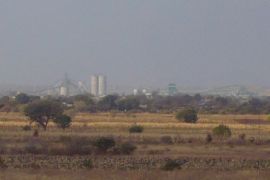
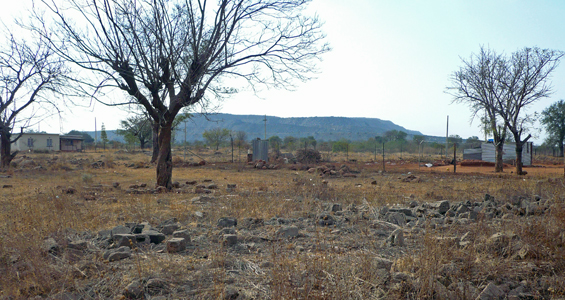 |
| The rubble of homes in Ga Pila where about 100 residences once stood before nearby mining started [Al Jazeera] |
The villages near the town of Mokopane, located in the province of Limpopo in the northernmost tip of South Africa, contain abundant wealth, but many of their residents reside in homes without foundations and have no access to water.
The sleepy settlements live in the shadow of one of South Africa’s most successful enterprises – platinum mining.
Keep reading
list of 4 itemsAfter the Hurricane
World’s coral reefs face global bleaching crisis
Why is Germany maintaining economic ties with China?
About 90 per cent of the world’s platinum reserves are in southern Africa.
Anglo Platinum, the world’s largest platinum producer, made a record $1.75bn in profits last year alone, primarily selling the metal to car firms making catalytic converters.
The South African government directly benefits via nearly $2bn in taxes it receives from Anglo Platinum.
Yet, their search for the valuable resource has caused about 20,000 South Africans to be displaced. For those who have remained in their homes it has caused enduring harm and bitterness.
Rose Dlabela, of Ga Pila village, said she has seen her community wither to a few worn-down homes as living conditions have deteriorated.
“We are not going anywhere. We are prepared to die. What they have done to us … there is no going back,” she said.
‘Forced removal’
Since 2000, much of Ga Pila has been reduced to rubble, its schools and churches are in ruins and services have been removed.
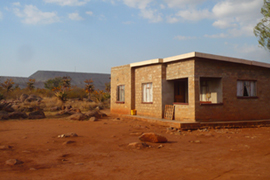 |
| Dlabela refuses to move from the home her family has lived in for generations |
“We use candles and have to cook with fire. We have gone back 100 years,” she said.
Dlabela says the destruction of her village is part of a process of attempted forced removal by Anglo Platinum after she and other residents refused to move.
She says the company, which is majority owned by Anglo American, the British mining giant, had offered her a new home in a purpose-built complex and a 5000 Rand ($608) payment when they came to take her land which is close to the site of their Potgietersrus Platinums Limited (PPL) mine.
“People from the mining company came and said that they would make our lives better – provide jobs for our kids and improve the quality of our land.
“But we never got anything. Instead they took the little that we had.”
Dlabela said the new house Anglo Platinum offered her was smaller then her current one and had no plaster on the walls or any foundations.
So Dlabela decided to stay in the home she and her family had lived in for generations.
Implications
Many did move – before 2000 there were about 100 households in Ga Pila but now there are just 28. As residents left the mining firm demolished their old homes.
 |
| Most electricity lines are no longer connected in Ga Pila |
Those that remained, however, would soon face growing challenges.
In 2001, Dlabela said her electricity and water supplies were cut off. Stones and waste from the mines were dumped around the village.
She said in 2005 the villagers began to plough their fields only for dozens of police vans to arrive and stop them.
The next day court edicts were delivered that said the villagers were not allowed to farm the land.
Anglo Platinum has taken some of the residents to court accusing them of trespassing on the land. They are still waiting for a verdict after their third and last hearing in 2004. The villagers will pay legal fees if they lose the case.
Yet, for others in the region the choices afforded to Dlabela are something of a luxury.
‘Land taken’
In Ga Chabe, a 20 minute drive away, the population of about 200 households were told that the mine was coming only days before it began production.
| “We use candles and have to cook with fire. We have gone back one hundred years” |
|
Rosa Dlabela, Ga Pila villager |
Before then most people in the village had about a dozen acres of land on which they grew red beans, pumpkins and watermelons, and raised livestock.
In the rainy season locals had enough food to sustain themselves and trade for other goods outside the village.
Stephen Tloudatla, an elder of the village, said that representatives from Anglo Platinum then came in 2002 and warned them not to plough any more.
A year later he says the company “just took our grazing and ploughing land and fenced it off”.
Sampson Makgamatho, another elder, said: “Everything is different now. We have no jobs, our children are not working. There is nothing.
“We are living on hand outs and government pensions or, for others, child support.”
The villagers complain of the effect of ‘blasting’ by the mine (the use of explosives to clear rock) on the community.
The blasting causes the walls of homes to crack and dust to contaminate the region, poisoning their land, water and air.
Some of the locals now complain of stomach cramps due to drinking the water.
Water contamination
A study last October found water at 10 sites near Anglo Platinum mines in Limpopo to be contaminated.
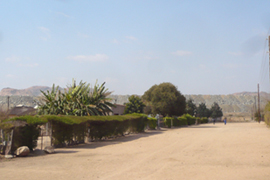 |
| Ga Chebe’s residents were not consulted about waste surrounding their homes |
The analysis by Carin Bosman, an environmental chemist, found high concentrations of salts, especially nitrates, most probably from mining waste.
These can cause stomach cancer and a fatal blood disorder.
In addition, the villagers have recently been told that their primary school is to be relocated.
Gabriel, a local in his late-twenties, said: “Our grandparents had paid since the 1920s to build that school and extensions to it.
“They worked hard with their hands to get the money to pay for it.”
The only compensation the villagers have been offered by mining firms is about 1000 Rand ($121) from Lonmin, another mining company prospecting in the area.
However, this has been taken by a Section 21 company – firms set up by Anglo Platinum in conjunction with regional tribal chiefs to ‘represent’ each community.
Tloudatla and Makgamatho said that if they do not follow the decisions of their Section 21 organisation they are ignored by their tribal administration.
The village has become divided. About 25 per cent of the population of Ga Chabe make up their Section 21 company, and they have about 80 other supporters. Together they are pitched against the rest of the community.
Poor compensation
Sterkwater is a village built by Anglo Platinum to re-house residents from Ga Pila.
| “[They] just took our grazing and ploughing land and fenced it off” |
|
Stephen Tloudatla, Ga Chabe village |
Isaac Pila said that in 2002 police arrived at his home in Ga Pila and forced him to move to Sterkwater.
Pila, 86, said: “They broke my old house and gave me this one.
“This place is no good for me. It has no foundations – it is just built on concrete. The walls are cold like ice as there is no insulation.
“In the old place I was planting, ploughing, growing some crops. Here there is no room to grow food or have livestock. Water does not even absorb into the hard ground and it is not flat.”
Only seven-years-old, Pila’s new house is also cracking – not because of any blasting, they are too far away from the mines for that – but because of the building’s poor quality.
“The mine just does it to get money and the government is corrupt,” he said.
‘No spin’
Al Jazeera made repeated attempts to interview officials at Anglo Platinum. However, a spokesperson at the company did not respond to any questions.
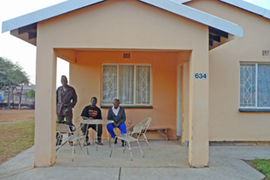 |
| Residents in Sterkwater village say their replacement homes have no foundations |
Their published communications say that the removal of residents to new villages were made in consultation with the community, via Section 21 groups.
However, Dlabela for one was unaware that a member of her community had signed away her home when the firm came to take her land.
The 28 remaining households in Ga Pila have sought redress from the municipality, state power company, government and police but with no success.
In past statements the firm has said that they aim to mine responsibly, “with due regard to the rights of the host communities,” and additionally provide millions of US dollars for poverty alleviation in South Africa.
Anglo Platinum and the municipality have provided water supplies but these have been sporadic at best.
A report by the charity Action Aid accuses Anglo Platinum of violating resident’s rights and urges the South African government to investigate the company’s operations.
Zanele Twala, Action Aid’s country director in South Africa, told Al Jazeera that Anglo Platinum had to stop hiding behind spin and begin tackling the problems they have created for community members.
She said: “Anglo Platinum must sit down and talk with true community representatives not just the ones appointed by the company.”
Government call
Twala said that the South African government must “ensure that mining companies respect human rights and the environment in all their operations”.
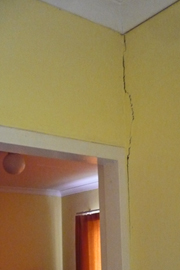 |
| The walls of Pila’s house have begun to crack |
She added that government policy and legislation must enforce community rights and make full consultation and informed consent compulsory for mining concessions.
Sputnik Ratau, the spokesperson for the minister of minerals and energy, said that meetings are being organised between the communities, Section 21 firms, and a government task team established to deal with the issue.
Ratau said: “There may have been insufficient consultation or issues not adequately addressed by the relocations.”
He said that it is unlikely that compensation would be paid that would address all matters: “We can’t come to a situation where everyone is satisfied, but can find compromises” and involve the communities in those proceedings.
Meanwhile, Anglo Platinum is expanding its activities in the Mokopane region.
This has led to the accusation by villagers that the firm has begun to dig up gravesites in the area.
But it is not just their ancestry that residents are concerned about. It is also the lives of their children and grandchildren who Makgamatho says will have to cope with the long-term effects of mining and relocation.
“We want compensation and we want it to be sustainable for the future. Even if the mine left today they will leave us with bad, wrecked land.”